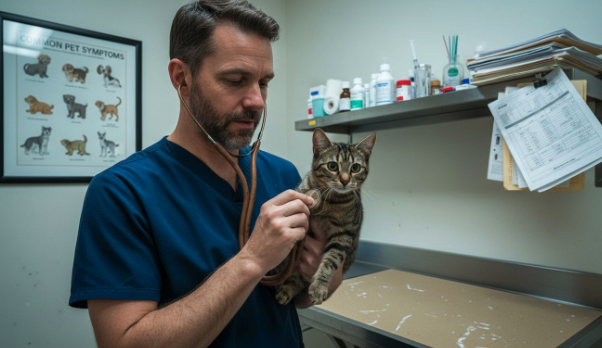Bringing a dog home is exciting and heartwarming, yet it also means promising to look after that new family member for life. Like people, dogs can get sick, but many common health issues are easier to dodge than most pet owners realize. This short guide walks you through typical canine conditions and shares simple steps to keep your pup living a long, active, and happy life.
You can also explore our article on Correcting Common Behavioral problems in Dogs to support your pup’s overall well-being.
Common Health Issues in Dogs and Their Prevention
Dogs can face anything from minor itches to serious illness, so spotting trouble early makes a big difference. Here are a few frequent concerns and straightforward prevention ideas to help keep your pet feeling its best.
Skin Allergies
Food ingredients, pollen, dust mites, or even lawn chemicals can spark skin allergies in dogs. The results are itchy paws, red patches, hair loss, and sometimes repeat ear infections that signal discomfort.
Prevention Tips:
- Identify and Avoid Allergens: Team up with your vet to figure out what sets off your dog, then limit contact as much as possible.
- Maintain a Healthy Diet: Serve balanced meals with quality protein, and ask your vet whether a hypoallergenic formula would help if food is part of the problem.
- Regular Grooming: Bathing your dog and brushing him often removes pollen, dust, and loose hair that can trigger allergies. Pick a hypoallergenic shampoo whenever his skin seems sensitive.
- Environmental Control: Cut back on airborne allergens by sweeping, vacuuming, and running an air purifier every day. Dont forget to wash his bedding and toys at least once a week.
Ear Effections
Ear infections rank among the most usual problems seen in dogs. They can spring from yeast, bacteria, or parasites in a warm, humid canal. Dogs with floppy ears or swimmers who spend hours in water usually suffer more. Look for itching, bad smell, red skin, or brown goo inside the ear.
Prevention Tips:
- Regular Ear Cleaning: Wipe the ears weekly with a vet-approved cleanser and cotton pad. Doing so lifts up wax, dirt, and trapped moisture that invite germs.
- Keep Ears Dry: After baths and swims, gently dry the flap and canal with a soft cloth. Dampness is the perfect breeding ground for future infections.
- Routine Inspections: Peek inside the ears every few days for swelling, discharge, or funny odors. Early catching allows simple treatment instead of painful, expensive visits.
- Avoid Irritants: Stay clear of muddy puddles and stop excessive scratching by giving chew toys, keeping the ears calm.
Dental Problems
Dogs can easily suffer from typical dental troubles-gum disease, cavities, and tartar build-up-that harm their whole body. Watch for signs like foul breath, swollen or bloody gums, loose teeth, or any struggle to chew their food.
Prevention Tips:
- Regular Brushing: Brush your dog s teeth two or three times each week with pet-safe paste and a gentle brush.
- Dental Chews and Toys: Give approved chews and sturdy toys that scrape plaque off as your dog gnaws away.
- Routine Dental Check-ups: Take your dog in for routine oral exams so your vet can spot problems before they worsen.
- Balanced Diet: Feed kibble or wet food that supports teeth and gums and skip treats that quickly turn into sludge.
Arthritis
As dogs grow older, arthritis may creep in and give joints pain, stiffness, and less pep for walks or play. Symptoms include slow rising, limping, hesitating on stairs, or flat-out refusing favorite games because movement hurts.
Prevention Tips:
Maintain a Healthy Weight Keep your dog lean with measured meals and steady exercise so extra pounds dont overload sore joints. Regular, gentle exercise keeps your dogs joints limber and muscles steady, so take them on brisk, low-impact walks or fun games of fetch. Skip aggressive jumps or long runs on hard ground that could set up strain. Joint-support chews with glucosamine and chondroitin may ease wear for seniors and big-breed pals, but always ask your vet which formula suits your dog best.
Give them a thick, orthopedic bed that cushions pressure points, making nap time easier on tired hips and elbows.
Obesity
Excess weight is a serious concern for dogs; it can trigger sore joints, wind troubles, heart trouble, and generally steal years from their lives. Warning signs include a plump belly, sluggish fetches, puffing during short walks, and stiffness after naps.
Prevention Tips:
- Balanced Diet and Portion Control: Choose a high-quality food with the right calories and nutrients, then scoop exact servings and skip endless refills. Treats should be small, nutrient-rich bits, not leftover pizza crusts.
- Regular Exercise: Aim for at least thirty minutes of brisk walking, sniffing, playing chase, or swimming- whatever keeps your dog happily moving. Mix in mind games or training sessions so activity fits both you and your schedule.
- Monitor Weight: Weigh your dog every month and look for a smooth tuck at the ribcage; a Vet Visit can add professional eyes and tweak meal plans.
- Avoid Human Food: Resist begging eyes and cut fatty scraps or sugary snacks that add empty calories but little joy.
Keeping everyday health problems from cropping up in your dog starts with looking after them before trouble begins. Use these simple tips so your pup can stay bright, playful, and by your side for years to come. Regular vet visits, good food, steady grooming, and lots of walks or games form the core of solid care. When you put those basics first, each wag of their tail reminds you both how well it pays off.
EXTRA:
Pawrpose AI is rethinking pet care smarter, kinder, and more connected. No more guesswork about your Pet’s Health, at any age.
Read more here: Pawrpose AI












